Clifford Garstang's Blog, page 109
February 10, 2012
Tips for Writers: Hit the ground running
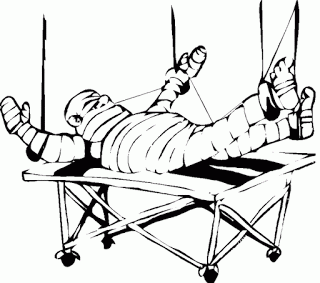
Earlier this week, Fictionaut ran ashort interview with me in which I mentioned an article by Sven Birkertsabout the beginnings of stories he reads as editor of Agni. The essay is called"FindingTraction," and it generally has the effect of frightening student writersbecause it seems to set an impossibly high standard for story openings. Ofcourse, all readers are different, including editors, so reactions will vary toopening lines. In discussions about the Birkerts essay I've heard people saythat they prefer a more leisurely beginning to a story, whatever that mightmean. Also, if you read older stories, you're likely to find plenty of examplesof great fiction that don't live up to what Birkerts says he likes to see.
Here's an excerpt:
Taking from the top of thefiction pile, for instance, I read: "John Maloney hunched his shoulders againstthe bitter wind coming off the lake." I stop and respectfully slide the pagesback into their envelope. The piece will be returned to its author.The problem seems to be—just to boil it down in the way thatI use it myself as an editor—that it's not new. The name's not new, the verbdoesn't do enough work, and the setting isn't newly imagined. There's noforward momentum or what Birkerts calls "traction." The story doesn't "hit the ground running."
Why? I could say a number of different things, andI will—because I voice them to myself and they seem to the point. I say(putting sentence- thoughts now to what would appear to an outside observer asa sequence of flinches, grimaces, and grumbling head-shakes), "This story iswooing me with a regular-guy protagonist. John Maloney—a name out of literary'Central Casting.' The writer is making the enormous assumption that a commonworld exists and that he need only set John Maloney loose in it. He hits meright off with a trite exaggerated middlebrow verb in order to inject drama,but the word—'hunched'—tells me that he has a secondhand, a 'literary,' idea ofwhat a story is or might be. He is either young and inexperienced, orexperienced and lazy. When a reader reads those words, she sees and feelsabsolutely nothing, or maybe gets a dull memory echo from the hundred thousandhunched shoulders she has met with in a lifetime's reading. There is no attemptto welcome her to the Never Before."
You can read the essay for yourself and draw your ownconclusions. The real lesson for me is to realize that openings are crucial. Asa writer I do not want to waste an opportunity to hook my reader, whether she'san editor or a bookstore browser. And so I want to really make that firstsentence do as much work for my story as possible.
I have been reading the most recent collection of stories byRichard Bausch, Something isout there. Bausch is a wonderful writer and story teller, and so I thoughtit would be an interesting exercise to look at the openings of each of thestories in this book. So, here we go:
· From "The Harp Department in Love": "Thismorning, while Josephine Stanislowski is tearfully packing winter clothes intoa big box for the attic, her friend and neighbor Ruthie calls about thesurprise party she's having for her husband, Andrew, celebrating his graduationfrom college."· From "Byron the Lyron": "She was eighty-nine andhad lived a long, rich life, and she told her one son, Byron, that she wasready."· From "Reverend Thornhill's Wife": "Keepingstrictly to the early-morning ritual, Diana prepared coffee, boiled one egg,and lightly buttered two slices of toast for him, then put cereal on for thegirls, and went and dressed for the day, while they ate."· From "Son and Heir": "They left at seven, plentyof time to go four miles, even with all the traffic lights in the city blankand dead."· From "Trophy": "Today I got a letter from an oldfriend inviting me to come back to Virginia to help him celebrate a new openingin his chain of hot-dog stands."· From "Something Is Out There": "By the time theygot back to the house, the snow had started coming fast in the swirling windover the mountains to the west."· From "Blood": "Walter Clayfield's older brother,Max, started the subcontracting business—house painting, carpentry, and wiring—uponhis return from a hitch in the army in 1998."· From "Overcast": "Here is how Elaine Woodsonattempted to describe things to herself one predawn:"· From "One Hour in the History of Love": "Hereare some people sitting in partial sunlight at one end of the Fresh Café patio,on Queen Street in the beautiful city of Toronto."· From "Immigration": "The middle of spring inMemphis and it felt like winter."· From "Sixty-five Million Years": "Because thiswas such a small parish, Father Hennessey knew many of the people who came toconfess, and he was afraid that when he saw them on his daily rounds it mightshow in his face that their troubles and failures had lately, in spite of allhis efforts to resist, been relegated to some zone of apathy in his heart."
What do you think? Would Birkerts accept these stories? Orwould he at least keep reading? Of these stories, six were published in Narrative Magazine. (I was surprised todiscover that; I have seen Bausch's stories in Narrative, but six in one book from the same magazine is a lot.) Idon't know if they would all pass the test from "Finding Traction," but for themost part they pass my version of it. Or at least they come close enough toforward momentum that I would keep reading to find out where the author wasgoing.
[About the picture: It was hard to find an illustration for "traction"in the sense that we're using it here, so I went with the pun instead.]
Published on February 10, 2012 12:53
February 8, 2012
I'm interviewed at Fictionaut
Published on February 08, 2012 05:37
Forthcoming Books: When the Night by Cristina Comencini
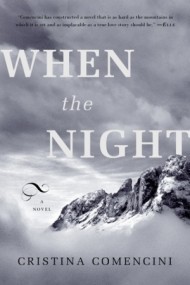 There are some publishers that are so good that you'd be willing to read anything they published, even if you knew nothing about the book or the author. Other Press is such a publisher. I can think of some outstanding books they've done that I've liked very much, and can't think of a single clunker.
There are some publishers that are so good that you'd be willing to read anything they published, even if you knew nothing about the book or the author. Other Press is such a publisher. I can think of some outstanding books they've done that I've liked very much, and can't think of a single clunker.This novel, When the Night, by Cristina Comencini, forthcoming in April, looks like another good one. Here's the description:
Manfred, a surly mountaineer recently abandoned by his wife, rents the upstairs apartment in his home in the Dolomites to Marina, a woman from the city, and her difficult young son. Deeply suspicious by nature, especially of women, Manfred spies obsessively on Marina, in whose shortcomings as a mother he finds resonances of his own mother's desertion of him in childhood. When Marina's frustration over her son's refusal to eat or sleep leads her to harm the child, Manfred steps in, and the silent power struggle between them escalates. Yet Manfred's attraction to Marina is as powerful as his distrust. In this alternately shocking and moving novel, Cristina Comencini has created a complex, psychologically profound portrait of two damaged, vulnerable people and the painful bond that develops between them as they are drawn into each other's worlds.I'd read that.
Published on February 08, 2012 04:00
February 7, 2012
Summer Writers' Conferences
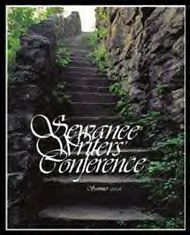 Although it's not very wintry where I live, normally at this time of year I am thinking ahead toward summer and, more specifically, to any writers' conferences I might attend. I've been to a lot of conferences. Too many, possibly, and after each one I usually tell myself that it's my last, that I've had enough and am burned out. Plus, at this point it may not be the best use of my time. I should spend the money and the time going somewhere to write--not to workshop.
Although it's not very wintry where I live, normally at this time of year I am thinking ahead toward summer and, more specifically, to any writers' conferences I might attend. I've been to a lot of conferences. Too many, possibly, and after each one I usually tell myself that it's my last, that I've had enough and am burned out. Plus, at this point it may not be the best use of my time. I should spend the money and the time going somewhere to write--not to workshop.That's what I told myself last year. After all, in 2010 I had been a Fellow at the Sewanee Writers' Conference, which I love, and since I couldn't go back there (I've never heard of anyone going back as a participant after they've been a Fellow), I planned to stay home, work in the garden, write, etc. But then I heard about people who were going to Tin House and Bread Loaf and I began to feel jealous. (I haven't been to Tin House, but I've heard very good things about it, and they always have a terrific faculty. I've been to Bread Loaf twice, and it's excellent, but very expensive.) I began looking around and I decided to go to the Tinker Mountain Writers' Workshop, partly because it's convenient--it's only 80 miles from where I live--but mostly because the "Advanced Novel" workshop was being taught by Fred Leebron, whom I knew to be an excellent teacher. Tinker Mountain is no Sewanee in terms of the campus or the atmosphere or the social programs, and there are far fewer writers at Tinker Mountain. But it has a terrific faculty and I learned a lot that I was able to apply as I continued to work on my novel. I'd even consider going back to work on my new novel.
And there are many other conferences out there. Your experience will depend mostly on the faculty you work with, and that's as true as Sewanee as it is anywhere else.
But now is the time to apply. I highly recommend Sewanee and you should also take a look at Tinker Mountain.
Published on February 07, 2012 12:36
February 6, 2012
The New Yorker: "Citizen Conn" by Michael Chabon
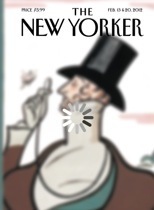
February 13 & 20, 2012: "CitizenConn" by Michael Chabon
I have to say that, even though I found the ending somewhatunsatisfying, I liked this story a lot.
It's the story of Morty Featherand Artie Conn, two giants of the comic book industry who years ago had afalling out. Now Morty is living in a nursing home in Santa Monica, near deathfrom bone cancer, and Artie, retired to San Diego, is seeking forgiveness. Noone can quite figure out why Morty is so upset with Artie, least of allRebecca, the new rabbi in the nursing home.
So, Artie makes several visits, tries to apologize and giveMorty credit that he might think is due him. But that's not it. There'ssomething else. And that something else is—sort of—revealed at the end. ButArtie still doesn't get it, probably because what Morty wants is somethingArtie can't really give him at this point.
It's a nice piece about friendship, and along the way Chabongets to write about comic books again. There's also a brief interview that'sworth reading: ThisWeek in Fiction with Michael Chabon.
Apart from the slightly unsatisfying ending, my one concernhere was with the narrative voice. I like the choice of the female rabbi,although (a) it isn't clear why it should be a female except that it'sinteresting that her husband is a fan of the comics, and that feels right; (b)the title of the story is too cute; and (c) I wonder if this is a crediblefemale voice. I can't really tell, and I'd welcome comments from women aboutthis.
[Also, I hate this week's cover, which is called "Loading,"but since I'm reading the Kindle version I don't have to look at it much.]
Published on February 06, 2012 19:38
February 4, 2012
Bookstores and Authors: Partners?
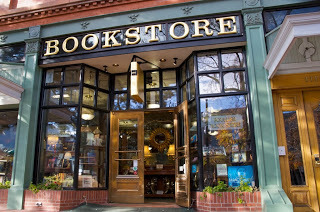 Here's an interesting piece in the WSJ by Emma Straub: How to be an Indie Bookseller's Dream. Very good advice here that is mostly common sense: be nice to the booksellers when you're doing an event in a store, don't read too long, be charming, send thank you notes.
Here's an interesting piece in the WSJ by Emma Straub: How to be an Indie Bookseller's Dream. Very good advice here that is mostly common sense: be nice to the booksellers when you're doing an event in a store, don't read too long, be charming, send thank you notes.I certainly agree with all that, but it seems to me that bookstores sometimes forget that the purpose of author appearances is for the store to sell books. The store collects the money. The author gets a little, but the store is getting 40%. The store is also getting customers into the store where they might buy other stuff--other books, gifts, and high-priced junk. And so, it seems to me, it also behooves the store to take some of their own advice: Be nice to the author.
Because sometimes, frankly, they aren't. I've dealt with some wonderful, wonderful booksellers and have had some fantastic in-store events. I love those stores. But I've also had some events where it almost seemed as if the store forgot they'd scheduled an event with me and looked at me like I was annoying them for showing up. And then, assuming some books are sold, that same bookstore may take six months to pay the publisher for those books.
The enterprise that we're both engaged in--bookstores and authors--is the same: we're selling books to readers. And it seems to me that we both benefit if an event goes well. This shouldn't be the sole responsibility of the author. We need each other.
In perusing the schedule for the upcoming AWP Conference in Chicago, this program caught my eye: "The Bookstore is Not Your Best Friend: Effective Small Press Marketing Strategies." Here's the description:
Many publishers and authors starting out mistakenly assume that the first (or even only) places they should market their books and journals to are bookstores. While bookstores should be their friends—and often are—they are not necessarily their best friends. In this panel, publishers and PR people from young yet successful small presses discuss alternative venues for readings and book sales, from anarchist bakeries to punk bars, galleries to outdoor fairs, burlesque nights to feminist groups.I've already learned this lesson. I love bookstores and I love doing readings in bookstores. I'll continue to do so and I'll attempt to take Straub's advice to heart. But I know there are lots of alternatives.
Published on February 04, 2012 19:18
February 3, 2012
Tips for Writers: To be or not to be
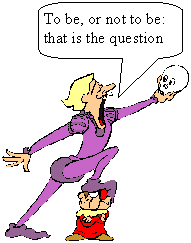
The verb "to be" is undeniably handy. We couldn't be withoutit. (Heh.) Unfortunately, "to be" lacks motion. For forward momentum inwriting, we need to look elsewhere. Of course, the verb "to be" will alwayshave a place and often we can't avoid it. (Except that often we can. In thepreceding sentence I originally wrote "often it can't be avoided"—and yet avoid it I did.)
"He was short. He was angry. He was combing his hair. As hewas crossing the room he was thinking of her."
Not only do all of these uses of "to be" create an air ofpassivity, they also "tell" the reader instead of showing her the stature ofthe character, his anger, and his action. The passive verbs also cause us touse extra words. Better word choice and stronger verbs have the added benefitof tightening our prose.
When I make this point in the classroom I usually share thisexcerpt from "Hands," the chapter in Sherwood Anderson's Winesburg, Ohio that introduces the character Wing Biddlebaum:Upon the half-decayed verandaof a small frame house that stood near the edge of a ravine near the town ofWinesburg, Ohio, a fat little old man walked nervously up and down. Across along field that had been seeded for clover but that had produced only a densecrop of yellow mustard weeds, he could see the public highway along which wenta wagon filled with berry pickers returning from the fields. The berry pickers,youths and maidens, laughed and shouted boisterously. A boy clad in a blueshirt leaped from the wagon and attempted to drag after him one of the maidens,who screamed and protested shrilly. The feet of the boy in the road kicked up acloud of dust that floated across the face of the departing sun. Over the longfield came a thin girlish voice. "Oh, you Wing Biddlebaum, comb your hair,it's falling into your eyes," commanded the voice to the man, who was baldand whose nervous little hands fiddled about the bare white forehead as thougharranging a mass of tangled locks.Wing Biddlebaum, forever frightened and beset by a ghostly band ofdoubts, did not think of himself as in any way a part of the life of the townwhere he had lived for twenty years. Among all the people of Winesburg but onehad come close to him. With George Willard, son of Tom Willard, the proprietorof the New Willard House, he had formed something like a friendship. GeorgeWillard was the reporter on the Winesburg Eagle and sometimes in the eveningshe walked out along the highway to Wing Biddlebaum's house. Now as the old manwalked up and down on the veranda, his hands moving nervously about, he washoping that George Willard would come and spend the evening with him. After thewagon containing the berry pickers had passed, he went across the field throughthe tall mustard weeds and climbing a rail fence peered anxiously along theroad to the town. For a moment he stood thus, rubbing his hands together andlooking up and down the road, and then, fear overcoming him, ran back to walkagain upon the porch on his own house.
In this excerpt Anderson does use "to be" a couple of times,but mostly he gives us tight prose and active verbs that put the reader right thereon the porch with Biddlebaum.
Give it a try. Take a paragraph from one of your stories and eliminate as many instances of "to be" as you can.
[By the way, I'm aware of the problem with the illustration I found on the Internet. Shakespeare friends, please forgive me.]
Published on February 03, 2012 10:48
February 2, 2012
Perpetual Folly Pushcart Prize Rankings of Literary Magazines for 2012
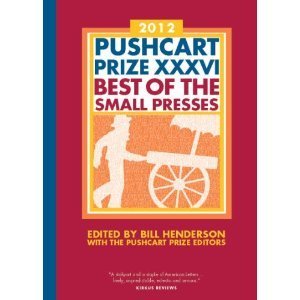 One of the most popular features of this blog is the ranking of literary magazines based on the number of Pushcart Prizes and Special Mentions the magazines have won over the last ten years. I originally created the list several years ago as a guide for my own submissions of short fiction. I wanted a relatively objective assessment of the "best" magazines, and this was what I came up with. I have updated the Fiction list each year since then as soon as the new Pushcart anthology came out in December. For 2012 I added companion lists--one for Nonfiction and one for Poetry.
One of the most popular features of this blog is the ranking of literary magazines based on the number of Pushcart Prizes and Special Mentions the magazines have won over the last ten years. I originally created the list several years ago as a guide for my own submissions of short fiction. I wanted a relatively objective assessment of the "best" magazines, and this was what I came up with. I have updated the Fiction list each year since then as soon as the new Pushcart anthology came out in December. For 2012 I added companion lists--one for Nonfiction and one for Poetry.Over the years, some have been critical of the lists, or of lists in general. I can only repeat that the lists seem to me to be a simple, relatively objective measure of consistent quality of magazines. I'm aware that it favors magazines that have been around for the full ten years that the ranking covers, but I don't think that detracts from the list. Newer magazines climb up the list and build their reputations. That's as it should be, it seems to me. Pushcart has for several years been criticized for discriminating against online magazines. The preference for the printed (on paper) word has at times been explicitly stated by the editor. This, I think, is a serious flaw in the Pushcart Prize and, therefore, the rankings based on them. I think change in this regard is inevitable. Online magazines have made some inroads in the annual volume. I expect this will accelerate and the problem will correct itself. We shall see. In the meantime, for those of us who submit work to online journals--some of which are excellent--we have to look elsewhere for measures of quality.
For now, I hope these lists are of some value to writers. If they are, please consider making a donation via the Donate button in the sidebar at right. Thank you.
Perpetual Folly Pushcart Prize Literary Magazine Ranking--Fiction (2012)
Perpetual Folly Pushcart Prize Literary Magazine Ranking--Nonfiction (2012)
Perpetual Folly Pushcart Prize Literary Magazine Ranking--Poetry (2012)
Published on February 02, 2012 07:00
February 1, 2012
Forthcoming Books: What We Talk About When We Talk About Anne Frank by Nathan Englander
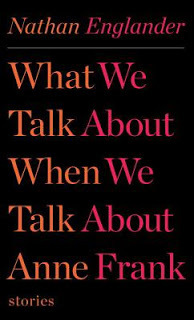 This collection of stories by Nathan Englander is due out on February 7, and should be a hit, as story collections go. The terrific title story was just in The New Yorker in December (go here for a discussion on this blog). "Free Fruit For Young Widows" was also in The New Yorker and was anthologized in Best American Short Stories 2011.
This collection of stories by Nathan Englander is due out on February 7, and should be a hit, as story collections go. The terrific title story was just in The New Yorker in December (go here for a discussion on this blog). "Free Fruit For Young Widows" was also in The New Yorker and was anthologized in Best American Short Stories 2011.
Published on February 01, 2012 04:30
January 31, 2012
Year of the LitMag: New England Review, Vol. 32, No. 3
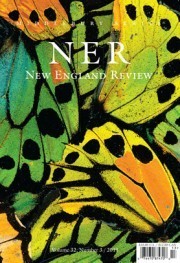
[This is the 6th installment in my Year of theLitMag Feature. If you are interested in writing about an issue of a literarymagazine, please leave a comment or send me an email.]
There's a lot to absorb in the latest issue of New England Review, Vol. 32, No. 3,including seven stories, several essays, and lots of poems. NER is one of myfavorite literary magazines, and it shows up near the top of the rankings: #12in Fiction,# 45 in Nonfiction,and #7 in Poetry.
Since I keep sending them short stories (no luck yet), I'malways curious about the stories they publish. There's quite a range in thisissue, but there might be some characteristics that tie them together.
Let me start with James Magruder's "Matthew Aiken's VieBohème" since Jim is a friend (we were Fellows at Sewanee together and recently hadoverlapping residencies at VCCA). This story,from his novel in stories, Let Me See It,due out in May, is set in 1981, when Matthew Aiken, a young gay man, isstudying in Paris. He doesn't get along with his host family, the amusing andemotional Sirjean family, or with his roommate, Bruce. But he does manage tomeet a man at the Beaubourg, with unhappy (but amusing for the reader) results.Let me just say that I learned a new French word: la chtouille. Funny and sad, a terrific read.
I also really enjoyed Scott Southwick's "Time Keeps onSlipping, etc." in which time does, indeed, slip into the future, relentlessly.Nicky is in grade school and his babysitter tells him he has the most beautifuleyes. In high school he becomes a reporter for the student paper and histeacher remarks on his eyes. His father out of the picture, Nicky is on his ownwhen his mother dies suddenly, and the future is now. Fast forward . . . "BradPitt played him in the movie version." Nicky's life has its ups and downs andwe get them all in this quirky story.
"Confession, with Wolves" by Carol Keeley is a monologue, awife speaking to her husband about their marriage. As with most monologues,this one is about the voice, in this case an unreliable narrator confessing toher husband about her . . . transgressions. And, in the process, the presentcircumstances are revealed. It's an interesting technique, the monologue, andthis is a good one."Manga Dolls on Skype" by Sandra Leong was fun, but I wasrooting for it to turn out differently. Michael Coffey's "I Thought You WereDale" was funny, although it felt like there was an inside joke I was missing.(Also it's an odd structure—allsections and no paragraphs.) While most of the stories are funny, "Keeping anEye on Jakobson" by Anne Raeff is not. It's a straightforward dramatic storyabout, among other things, the sorrows of war.
And there's more, including poems by both the Director andthe Assistant Director of the Bread Loaf Writers' Conference, Michael Collierand Jennifer Grotz, which, like the New England Review, is also connected toMiddlebury College. There's a poem by Chelsea Rathburn, a friend from Sewanee.And there are several notable essays, including one by Michael Milburn about hisbrother Frank: "My Brother, the Writer." I especially enjoyed this because wepublished an essay by Milburn in Prime Number Magazine recently: "MyMemoir."
It's an excellent issue from a wonderful magazine.
Published on January 31, 2012 12:40




